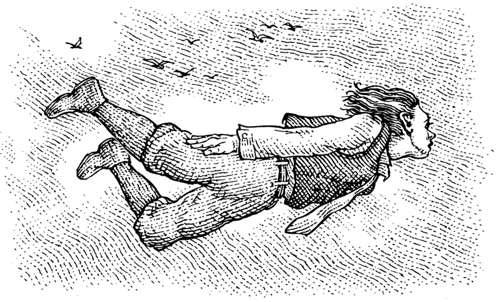A Field Guide to Lucid Dreaming (19 page)
Read A Field Guide to Lucid Dreaming Online
Authors: Dylan Tuccillo,Jared Zeizel,Thomas Peisel

works in dreams. Transportation is one of the most useful and
=
125
<
practical abilities in the dream and is a must for any lucid dreamer
who wants to explore their inner landscape.
Movement in the dream world is a bit different from moving
around the waking world. If you want to get somewhere in the
waking world, you’re used to certain forms of travel: a bus, car,
bicycle, skipping, frolicking, just plain walking, etc. You have to
move your body, and every movement takes a certain amount of
time.
Your morning commute takes forty-five minutes. That relax-
ing trip to the Bahamas requires you to spend ten hours on an
airplane, trapped next to a crying baby.
In the dream world, this is not the case. The laws of space and
time don’t apply to the lucid dreamer. Getting from point A to
point B is a matter of intention and focus; changes in location can
happen instantaneously. With this mastery comes the freedom to
explore and travel to far-off places or even distant times.
In this chapter you’ll learn some of the easiest ways to travel.
Of course there’s everyone’s favorite—flying. We’ll also learn to use
doors and mirrors to enter new locations and eliminate movement
altogether through teleportation. As a conscious dreamer, you’ll no
longer be confined to the current dream you are having. You’ll be
able to use these techniques to explore any place of your choosing.
Want to go to Egypt and see the pyramids? Want to visit your
friend’s house across the country? Maybe take a quick hop to outer
space? No problem. Your suitcases and suntan lotion aren’t neces-
sary; all you’ll need is a strong intention. Save the gas money and
the frequent-flier miles because this trip is completely free.
=
126
<


Transportation Principles
1. No gravity.
That isn’t to say that things are floating around
as they would in outer space, but gravity in the dream world is
not something that you must abide by. The law of gravity can be
broken and bent at will. Soaring through the skies like Wonder
Woman, jumping hundreds of feet in the air, or barrel-rolling
above moonlit clouds will soon become commonplace.
2. No space or time.
In the
dream world, everything
I start off at a moderate jog. After about
two dozen steps, I lift my legs up and float
exists in one big eternal
only feet from the ground. I arch my back
now. This notion might
and aim my head for the pillowlike clouds
seem a bit crazy for us ratio-
above me. Slowly, I begin to rise, gaining
nal thinkers who see time as
height with each passing moment. After
something that only moves
about fifty yards, I’m soaring with ease
forward, but dream time
right above the trees. I tell myself that
can be warped or reversed.
I’m in the present moment. The world is
real. The sun shines more beautiful than
Travel across great distances
I have ever seen. I can feel its warmth,
at the blink of an eye; noth-
and it casts gorgeous rays upon the leaves,
ing is stopping you. You
my hands, and everything in my sight. I
will soon find out just how
stay at a low altitude so that I can glide
boundless and infinite this
gleefully at the tops of the trees. I run my
place can be.
fingers through the leaves. Soon Tom joins
me. We take off into the clouds, which
have already begun turning into giant pil-
3. Movement via will.
Since
lows. —JAred Z.
you are no longer in a physi-
cal space, but rather a
=
127
<

“mental” space, movement (putting one foot in front of the other,
also known as walking) is not necessary for travel. As we have just
found out, space is not a factor, so moving or traveling requires
only one thing: a focused thought or intention. If you want to go
somewhere specific, all it will take is your willpower; the scene will
change instantaneously.
=
128
<


Lucid in the Sky with Diamonds
It isn’t a surprise that flying is the primary form of travel among
dreamers. Most people report that this is their favorite thing to
do when they find themselves self-aware in their dreams. The feeling
of the wind rushing across your face, the freedom and exhilaration
of moving in any direction,
free of all limitations, is
quite an intoxicating expe-
When I first began lucid dreaming, I was
surprised that flying had to be learned. As
rience. Although flying is
if I was walking for the first time, flying had
one of the easiest ways to
its own intricacies and nuances that made
travel while dreaming, it is
it a unique experience to fully understand.
a skill that takes confidence
I remember having a very difficult time,
and practice to master. You
for example, on stopping or making sharp
don’t have to be an angel
turns because I would always fly too fast.
to earn your “wings,” but
I also would have to run for a little while
and leap into flight. Taking off without
developing a capacity to fly
a boost of momentum was tough. I also
with control takes trial and
woke myself up plenty of times because
error and a bit of practice.
hitting something or flying too fast would
Think of the following
jolt me awake. —ThoMAS P.
as a flight manual in Aerial
Oneironautics. It will teach
you the basics needed for dream air travel. As you develop more
control, you’ll gain new skills and maneuverability. You’ll find
yourself flying at incredible speeds or at unreachable heights, per-
forming aerial acrobatics that’ll make any superhero blush with
envy.
=
129
<
Takeoff
When you become lucid, take a second and ground yourself
with some stabilizing techniques before jumping right into
flight. It’s important to begin your flying modestly. Take it slow,
Top Gun. Start off by jumping up and floating. Feel what it’s like
to be weightless. As you’ll quickly find out, gravity only exists in
the dream world if we want it to exist. At first it will seem as if
gravity and other physical laws are present, but as soon as you
focus on drifting up toward the sky you’ll see your toes gently lift
off the ground. Think “float” and see yourself floating. That’s all
it takes, it’s that easy.
If you still need help getting off the ground, use one of the
visualizations below; images of wings or devices will help your
logical mind accept the “impossible” reality of flying. These visual-
izations are, of course, unnecessary, but they can serve as “training
wheels” for first-time fliers.
Remember, it’s all about your thoughts and expectations.
Believe that you can fly and you can, fear that you’ll fall, and
you will. Like Peter Pan and Wendy, think happy thoughts. Each
dreamer flies in his or her own method of flight, but here are a few
examples. Try a few of them out and see which works best for you.
The SuPerMAN.
Fist forward, just like the Man of Steel.
The SWIMMer.
Swim through the air using a stroke you’re com-
fortable with.
=
130
<
The oWl.
Flap your arms like a bird.
The ScI-FI/FANTASy.
Use a helpful device such as a jet pack
or magic carpet.
The BouNce.
Take leaps and progressively jump higher each
time. Tell yourself that you are weightless. On the last jump, lean
forward, and jump into the flight.
The PIxIe.
Shape-shift into a bird or grow butterfly wings.
Speed
You jump into flight and start gaining altitude. The ground
below you shrinks, and your body moves faster, lurching for-
ward toward the horizon.
Now that you’re up in the air, there’s the matter of control.
Flight can easily get unstable and out of balance. If you’re flying
too fast, making a sharp turn can be quite the difficult maneuver.
Controlling your speed and ability to turn is an important step in
your flight training. When starting off, keep your speed to a nice
cruise so that you can get used to the feeling and weight of your
